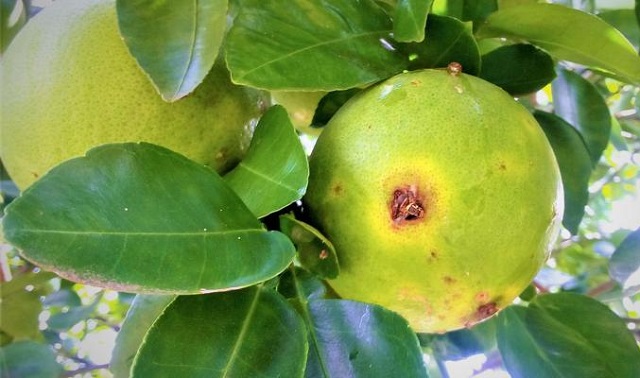
Kampala, Uganda | THE INDEPENDENT | The mediterranean fruit flies, have ravaged citrus gardens in Nwoya district. The flies cause the fruits to turn yellow and drop early.
Among the affected sub-counties are Lungulu; Kochgoma, Lii, Alero, Purongo and Anaka – which has left a section of farmers counting losses.
Richard Okello, a farmer from Lii sub-county explains that he earns over at least 1.5 million shillings from oranges but the flies have affected his income.
Lucy Adong, another farmer in Kalang village in Kochgoma sub county reveals notes that her half an acre of citrus field is already pest-ridden which has affected her dreams of reaping big from the perennial crop.
The Kochgoma sub-county Agriculture Officer, Mark Maktunu says that the mated female flies attack cultivated citrus fruits by laying eggs under the peel or flesh of the fruit on a host plant, causing damages that lead to significant economic losses.
Philip Mungujakisa, a farmer facilitator with Midway Consultancy Firm & Associates explains that the flies’ larvae hatch and burrow inside the fruit flesh to feed on the pulp that renders it unfit for human consumption yet citrus fruits especially oranges and lemons are an excellent source of immune-boosting vitamin C.
Mungujakisa advised farmers to practice good sanitation to get rid of the decomposing fruits and mulching citrus gardens to limit alternative host plants for the flies and their larvae.
Nwoya District Agriculture Officer, Alfred Kilama says that the extension workers are training farmers on integrated pest management and biological control techniques.
He added that limited spraying of groves with targeted pesticide and mass trapping technique (Pheromone Traps), best applied at low pest levels to trap the male flies make females lay sterile eggs and reduces the fly population.
According to Food and Agriculture Organization – FAO, citrus and citrus products are a rich source of vitamins, minerals and dietary fibre (non-starch) that are essential for normal growth and development and overall nutritional well-being.
******
URN
 The Independent Uganda: You get the Truth we Pay the Price
The Independent Uganda: You get the Truth we Pay the Price



